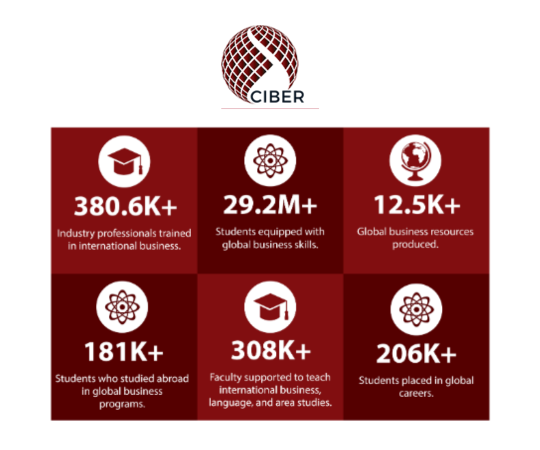CIBER Network
The Centers for International Business Education and Research (CIBERs) were created by Congress under the Omnibus Trade and Competitiveness Act of 1988 to increase and promote the nation’s capacity for international understanding and competitiveness. Administered by the U.S. Department of Education under Title VI, Part B of the Higher Education Act of 1965, the CIBER network links the manpower and technological needs of the United States business community with the international education, language training and research capacities of universities across the country. The thirty-one Centers serve as regional and national resources to business people, students and teachers at all levels.
CIBERweb represents the national website for the Centers for International Business Education and Research. To find out more information about what programs are currently happening on a “national” basis, visit CIBERweb.


Overview
Building on the strengths of their faculty and staff, each CIBER organizes a variety of activities to advance the study and teaching of international business and to support applied research on United States competitiveness in the global marketplace. Examples of such activities are listed below:
- Internationalizing the business curriculum by dramatically increasing the number of interdisciplinary courses, existing courses with international content, study abroad and other international exchange opportunities for students
- Creating faculty development and enrichment programs for business faculty from colleges and universities around the nation, such as low-cost study trips to Asia, Latin America, Western and Eastern Europe, and intensive two- to three-week workshops at host universities
- Collaborating with modern foreign language departments to develop business language courses for students and to provide intensive language training programs for business persons
- Providing support to small and medium-size business firms seeking to develop overseas markets. Educational programs for business may include, for example, export training, market information, management reviews and response strategies to increased international competition
- Funding research projects, events and publications on issues of strategic national interest, such as international competitiveness issues
- CIBERs work collaboratively with one another, with other departments and disciplines within their universities, other colleges and universities regionally and nationally, government and trade councils, professional associations and business.
For more information on CIBERs, visit the USDE – International Education Programs Service.



